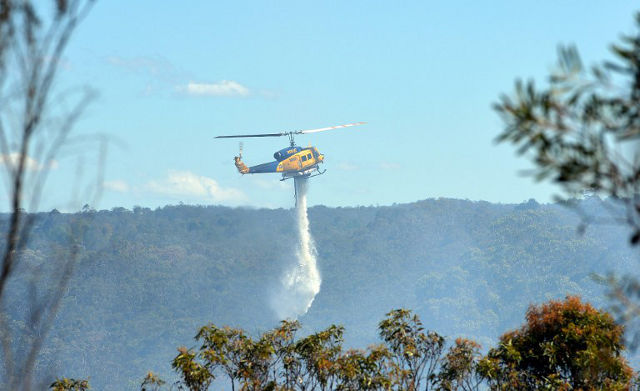SUMMARY
This is AI generated summarization, which may have errors. For context, always refer to the full article.

SPRINGWOOD, Australia – A water-bombing aircraft tackling newly flaring wildfires in Australia crashed on Thursday, killing the pilot, as the military apologized for starting a huge blaze that has left residents living in fear.
Thousands of largely volunteer firefighters have been battling infernos for eight days across the state of New South Wales that have destroyed more than 200 homes, with the Blue Mountains region west of Sydney the focal point.
Cooler weather initially helped Thursday, but gusty winds saw two major blazes upgraded to the highest “emergency” level again, with authorities urging communities not to be complacent.
A pilot become the second person to die in the bushfire emergency when his fixed-wing aircraft went down in a remote area south of Sydney as it responded to a blaze near the town of Ulladulla.
Reports said a wing snapped off before the crash.
“It’s a tragedy for the firefighting community, but first and foremost it’s a tragedy for this man’s family,” said NSW Rural Fire Service chief Shane Fitzsimmons, who lost his own father in a bushfire in 2000.
An ambulance officer was winched into the rugged terrain where the crash happened and confirmed David Black, 43, was dead. He was unable to recover the body due to fires still burning in the area.
One of the biggest and fiercest infernos still alight — which has a perimeter of more than 300 kilometres (185 miles) and has ripped through 47,000 hectares (116,000 acres) of land — was started by the military, a fire service investigation found.
The huge blaze near the town of Lithgow, which flared again Thursday, was a major worry this week with authorities on Tuesday deciding to deliberately merge it with another nearby fire at Mount Victoria to prevent conditions from deteriorating.
The official investigation found it was started by exploding ordnance on a live firing range on Wednesday last week.
“It wasn’t deliberate, it was a side-effect of a routine activity… and clearly there was no intention to see fire start up and run as a result of that activity,” Fitzsimmons said, adding that the military had fully cooperated.
Acting Chief of Defence, Air Marshall Mark Binskin, apologized after a furious Blue Mountains mayor Mark Greenhill demanded answers.
“I do apologize,” he said, adding that “what I do know to date is it was an explosives activity, it was a demolition activity in support of our people that train for operations around the world.”
Greenhill had earlier said the Blue Mountains community was owed an explanation.
“I would have hoped on a day like that, which was a dry day, a hot day, with the winds — the Australian military would have known it wasn’t a good time to be igniting,” he said.
“The fire has caused great concern to my community, it’s done damage to my community and it just shouldn’t have happened.”
So far, more than 124,000 hectares of land has been burnt across NSW in its worst bushfire emergency in nearly 50 years.
After dire warnings that extreme heat and strong winds would cause chaos on Wednesday, the high-risk strategies of aggressive backburning — a tactic aimed at creating firebreaks to control the path of blazes — building containment lines and strategic planning averted what had been feared could have been a major disaster.
While homes have been destroyed, human fatalities have been minimised as residents heeded advice either to flee or seek refuge at evacuation centres. Just one man had died trying to defend his home before Thursday’s plane crash.
Authorities began scaling down their operations Thursday and Fitzsimmons apologized to people returning to gutted homes in the Blue Mountains.
“On behalf of the firefighters who are doing it so tough up there, we do apologize and regret that we weren’t able to save everything.
“We are very acutely aware, because our teams are embedded in those local communities… there has been so much damage and destruction and people have lost everything.
“They did their best, and they will continue to do their best.” – Rappler.com
Add a comment
How does this make you feel?
There are no comments yet. Add your comment to start the conversation.